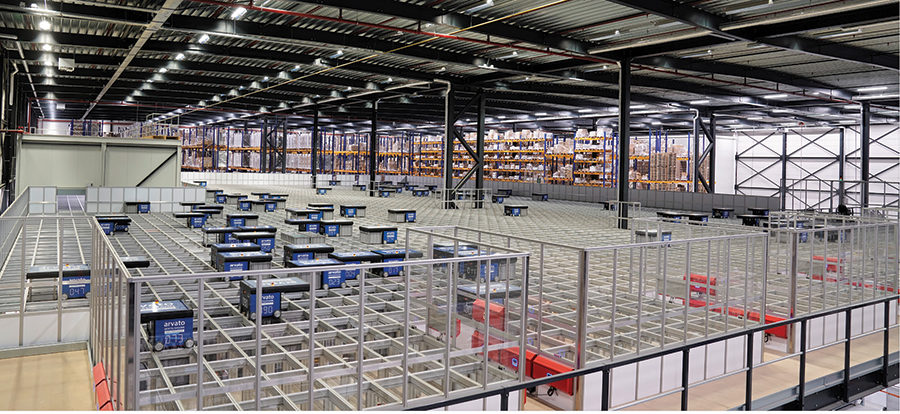A speedy solution to e-commerce challenges
Supply chain solutions provider Arvato scales up quickly to meet customer demand in the Netherlands thanks to an automated storage and retrieval system from Swisslog.

Logistics solutions provider Arvato Supply Chain Solutions has long taken a technology-first approach to growing with its customers—a strategy that has helped the company scale up quickly to meet accelerated e-commerce demand during the pandemic.
Arvato’s Heijen, Netherlands, warehouse is a case in point. The operation handles e-commerce fulfillment for fast-growing Dutch luxury cosmetics brand Rituals Cosmetics, which had already been feeling growing pains by the time the pandemic spurred an explosion of e-commerce activity in 2020. Arvato had to act quickly to keep up with the added demand, according to Maurijn Hellenthal, the company’s senior logistics engineer. So company managers turned to systems integrator Swisslog to capitalize on a pre-pandemic investment the firm had made in an AutoStore goods-to-person automated storage and retrieval system (AS/RS).
MEETING THE CHALLENGE
Swisslog had implemented a two-phase AutoStore project at the Heijen facility just before the pandemic hit, in response to the double-digit growth Rituals Cosmetics had been experiencing as one of the Netherlands’ fastest-growing companies. The first phase of the project went live in 2019, featuring a compact AS/RS with 36 AutoStore robots, six picking stations, two inbound stations, and a grid that could accommodate up to 36,000 storage bins—just a portion of which was in use initially. The plan was to scale up in 2025, adding six more picking stations and another 36 robots.
But the moment of expansion came much earlier as retail stores were shuttered during Covid-19 lockdowns and e-commerce orders surged, causing both the volume and structure of daily orders to change.
“Consumers went on a hoarding spree and ordered a lot more in one fell swoop,” Hellenthal recalls of the early days of the pandemic. “A day after Germany announced a lockdown as a result of the second wave, no fewer than 40,000 orders came in. That is twice as many as during Black Friday, for example.”
Swisslog fast-tracked phase two, adding 15 robots immediately and another 50 shortly thereafter. The number of picking stations doubled, and Arvato soon began using the system’s additional storage capacity. Downtime was minimal, and the entire expansion was completed in just a few weeks. As a result, Arvato was able to move to 24/7 operations at the Heijen facility.
REAPING THE REWARDS
Arvato’s AutoStore system is driven by Swisslog’s SynQ warehouse management system (WMS), which allocates incoming orders to a put-to-light order pick cart, where fast-moving items and larger products are picked first. Workers then wheel the carts to the goods-to-person picking stations, where smaller goods are delivered to pickers via the AutoStore system. Filled orders then move by conveyor for further processing or immediate packaging.
The prime benefit of the expanded system is Arvato’s ability to handle increased volume and adjust to spikes in demand, but there are other benefits as well. Arvato’s leaders say they’ve gained more control over the fulfillment process, have maintained the flexibility to scale even more, and can accommodate higher handling speeds through the system. The Heijen warehouse also includes a specially designed hazardous substance storage system that is integrated into the AS/RS—a necessary component for handling the gases, aerosols, and flammable liquids that are part of the Rituals Cosmetics product line.
“That was a complex challenge because nothing like this had ever been done before,” according to Hellenthal, who characterizes the entire project as “transitional” for the company moving forward. “Arvato took on this solution, also with regard to regulations, insurance, and, of course, safety. That took some serious work.”
Related Articles

Copyright ©2024. All Rights ReservedDesign, CMS, Hosting & Web Development :: ePublishing